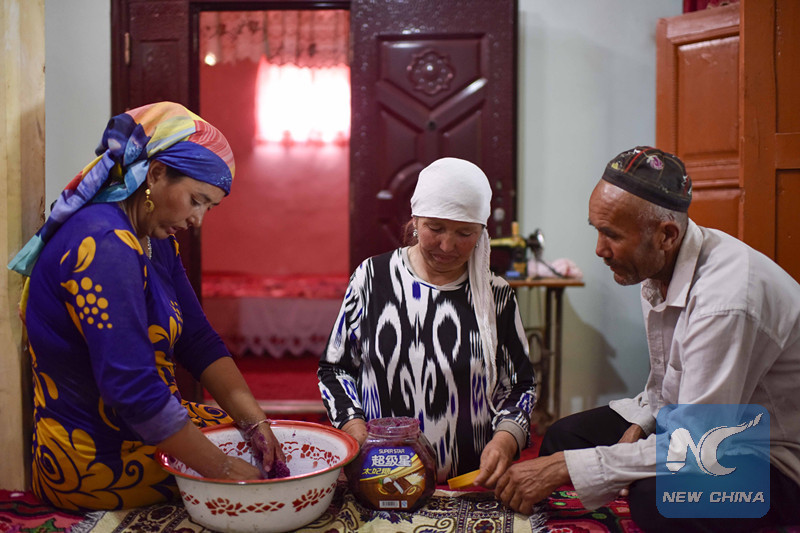
Rose petals to be made into syrup.(Xinhua/Zhao Ge)
As blooming season approaches, Eyshihan Hemra, a flower farmer living in Arele township, Yutian county, northwest China's Xinjiang Uygur Autonomous Region, is busy making sweet for her families--the rose syrup. For Eyshihan and her fellow villagers, roses not only bring cash into their pockets, but also add sweetness to their life.
Located on the verge of Taklimakan Desert, Arele township is dubbed "homeland of roses" in China as villagers there take a fancy to the flower. The Khotan rose, a dominant species in Arele, is a variant of Damascus rose introduced to China thousands of years ago along the Silk Road, an ancient trade route linking the east with the west. In Uygur medication, the Khotan rose is used to make medicines.

Eyshihan Hemra sifts buds from rose petals in her courtyard. (Xinhua/Zhao Ge)
What makes roses so special in Arele township is the abundant water and solar-thermal resources, which bestow the flower distinctive color and fragrance. Every year, in the months of May and June, roses come to full blossom. Walking down the fields, what you see are blooming flowers dangling on the trees with sweet aroma in the air permeating through your nose and every inch of skin. It's the high time for local Uygur people to make rose syrup.
Eyshihan Hemra's father, Hemra Hemur, in his 60s, has been a rose farmer for three decades. "Almost every household in Arele plants roses for the flower outreaches other crops in economic values," Hemra Hemur said, adding that the price of roses has been rising for continuous years.

Eyshihan Hemra(L) is making rose syrup with her parents. (Xinhua/Zhao Ge)
To make good rose syrup, every initial step, from sifting petals to kneading, matters. The syrup will taste better if soil and buds are all cleared. Accurate weighing of ingredients is to ensure that the syrup is well-proportioned in sweetness, Hemur said,"One kilogram of rose petals fit best with three kilograms of sugar."

Eyshihan Hemra is tearing petals off.(Xinhua/Zhao Ge)
Eyshihan Hemra is a mother of three kids. Among them, two are studying in Karamay, a city in Xinjiang, and Beijing. "Every time my children are about to leave for school, I will give them some rose syrup," Eyshihan said with a smile on her face. She said the kids all like her hand-made syrup.
"Every Uygur girl here can make rose syrup, it's a must-have skill. But now with electric blenders, fewer people choose to knead flowers by hand." Eyshihan Hemra insists hand-made syrup gives the best taste.
For Uygur ethnics in Khotan region, rose syrup is a commonplace condiment. Crusty pancakes naan, a pot of medical tea and a small tray of syrup will make a meal.
The sweetness given forth by scented flowers and sugar in the syrup lingers on the lips and in people's minds. For years, it has become local people's recipe of leading a sweet life.

